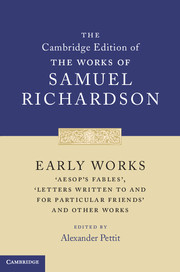Book contents
- Frontmatter
- Dedication
- Contents
- General Editors’ Preface
- Acknowledgements
- Chronology
- List of Abbreviations
- General Introduction
- Textual Introduction
- The Apprentice’s Vade Mecum (1733)
- A Seasonable Examination of the Pleas and Pretensions (1735)
- Preface to Aubin, A Collection of Entertaining Histories and Novels (1739)
- Aesop’s Fables (1739)
- Letters Written to and for Particular Friends (1741)
- Six Original Letters Upon Duelling (1765)
- Appendix: The Infidel Convicted (1731)
- Postscript
- Emendations
- Word-division
- Bibliographical Descriptions of Early Editions
- Explanatory Notes
- Index
The Young Man’s Pocket Companion: Part I
Published online by Cambridge University Press: 30 June 2022
- Frontmatter
- Dedication
- Contents
- General Editors’ Preface
- Acknowledgements
- Chronology
- List of Abbreviations
- General Introduction
- Textual Introduction
- The Apprentice’s Vade Mecum (1733)
- A Seasonable Examination of the Pleas and Pretensions (1735)
- Preface to Aubin, A Collection of Entertaining Histories and Novels (1739)
- Aesop’s Fables (1739)
- Letters Written to and for Particular Friends (1741)
- Six Original Letters Upon Duelling (1765)
- Appendix: The Infidel Convicted (1731)
- Postscript
- Emendations
- Word-division
- Bibliographical Descriptions of Early Editions
- Explanatory Notes
- Index
Summary
Containing useful Comments and Observations on the Covenants entered into between Master and Servant, by way of Indenture; wherein that wise Obligation is considered Article by Article. With some occasional Remarks on Playhouses, and particularly on one lately erected.
We shall begin with a short Definition of the Words Indenture and Apprentice, which are very expressive of the Sense in which they are used.
The first is derived from the French Endenter, to jag, or notch, and signifies a Writing, which contains an Agreement between different Persons, whereof there are two Copies, which being cut, waved or notched, tally to one another when put together, and prove the Genuineness of both.
The Word Apprentice is derived also from the French Apprentisse, from the Latin Apprehendere, which signifies to apprehend or to learn, which is the Duty of a young Man entering into an Engagement to learn or apprehend the Art or Mystery to which he is bound Apprentice.
We shall now pursue our Design in the first Part, and give the Words of this Covenant, and make some brief and useful Observations thereon Paragraph by Paragraph.
This INDENTURE witnesseth, That N. N. the Son of N. N. of - - - - -
Gent. doth put himself Apprentice to A. B. Citizen and - - - - - of London, to learn his Art, and with him, after the Manner of an Apprentice] (i.e. in a faithful, dutiful, and obliging Manner, as a good Servant and willing Learner ought) to serve from the Day of the Date of these Presents, until the full End and Term of Seven Years from thence next following, to be fully complete and ended.
Duringwhich Term the said Apprentice his said Master faithfully shall serve, Secrets keep] i.e. All those Secrets which relate to his Family-Affairs or Business, or to any Part of his Concerns, which being revealed, might be detrimental to his Master's Reputation or Interest. There is a good English Proverb, That a Man's House should be his Castle; intimating the inviolable Regard which Servants taken into a Man's Family, and who are become a Part of it, ought to have to whatever may tend to the Reputation or Profit thereof.
- Type
- Chapter
- Information
- Early Works'Aesop's Fables', 'Letters Written to and for Particular Friends' and Other Works, pp. 15 - 25Publisher: Cambridge University PressPrint publication year: 2011

